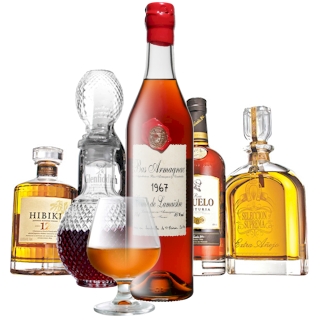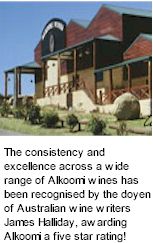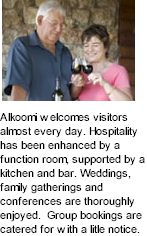


Merv and Judy Lange are pioneers of the wine industry in the Frankland River district. They planted their first vines in 1971 – Riesling, Cabernet Sauvignon, Shiraz and Malbec – and produced their first wines in 1976. Today, Alkoomi is one of the largest family-owned wine producers in Western Australia. The Lange’s son Wayne, daughter Sandy, and extended family members are all actively involved in the business.

The Alkoomi vineyards and winery share similar climatic conditions to those found in Bordeaux, France thus it is not surprising that Alkoomi produces some of the finest wines made in Australia. The name Alkoomi is taken from a local aboriginal dialect and translated means a place we chose. The Alkoomi logo is a stylised representation of an Australian grass tree which grows in the area.
Alkoomi’s red wines enjoyed success early on and Alkoomi has continued to produce elegant cabernet, shiraz and cabernet blends. The quality of Alkoomi Riesling has helped establish the reputation of Frankland River as one of the best areas for this variety in Australia and the Sauvignon Blanc is also regarded as one of the best in the country.
Alkoomi’s annual production of about 80,000 cases is distributed to all parts of Australia and is exported to more than ten countries in Europe, North America and Asia. The consistently superb varietal flavours across a wide range of Alkoomi wines have been recognised by the doyen of Australian wine writers, James Halliday, awarding Alkoomi a five star rating in his “Guide to the wines of Australia”.

The Alkoomi vineyard is located only 80kms inland from the Southern Ocean, resulting in good winter rains and dry ripening months. Summer days and evenings are cooled by fresh sea breezes, enabling ideal slow ripening of grapes. This climatic pattern is very similar to that of the best Bordeaux vintages. The property includes large areas of suitable soils and aspects. From the initial planting of about one hectare, the area under vine has been expanded throughout the 1980s and ‘90s and expansion of the vineyard has continued steadily over the next decade.
Alkoomi uses water supplied from on-site dams efficiently to prevent vine stress during extended dry periods without sacrificing the naturally low yields that produce concentrated flavours. The vines are all pruned by hand. Machine harvesting occurs in the cool of the morning, usually starting at 2.00am, to ensure that grapes arrive at the winery in top condition. The winery is completely self-contained, including bottling, labelling and packaging. All processing equipment – presses, fermentation, oak barrels and stainless steel tanks – is modern and maintained in outstanding and clean working order.
Alkoomi’s premium wines take advantage of the fact that several red and white wine varieties produce excellent quality fruit every year. All of these wines may be enjoyed while young but also cellar very well for several years. During the 1990s, Alkoomi introduced three super-premium wines using small parcels of the best quality grapes from the extensive vineyard. The wines are matured in selected French oak which gently enhances the wine flavours to produce styles of wine that cellar well but can be enjoyed when young. Each of these wines takes its name from one of the magnificent eucalypt (gum) trees that are present on the property.
